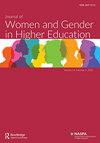国外黑人女性:性别、种族、语言和文化的建构
Q2 Social Sciences
Journal of Women and Gender in Higher Education
Pub Date : 2023-04-03
DOI:10.1080/26379112.2023.2206664
引用次数: 0
摘要
在这个定性研究中,我们描述了性别、种族、语言和文化如何逐渐塑造研究者的发展。使用协作的自我民族志设计,我们理论化了我们作为两个黑人妇女在巴西和埃塞俄比亚进行论文研究的经历。我们的数据来源包括回顾性访谈、期刊反思和研究人员备忘录。我们得出了四个反映我们作为研究人员发展的主题:(a)边界扳手的重要性,(b)本地知识的力量,(c)协商使用本地和“国际”语言,以及(d)由于他人的看法而形成的研究人员假设。我们使用一个综合框架来理解这些主题,该框架结合了研究人员发展模型和黑人女权主义定性调查的概念化。我们的研究结果对支持有色人种博士生的从业者和使用黑人女权主义认识论进行自我民族志工作的研究人员具有启示意义。通过分享这些主题,我们为高等教育环境中代表性不足的研究人员的理论、研究和实践做出了贡献,特别是与博士研究的语言和文化方面有关。本文章由计算机程序翻译,如有差异,请以英文原文为准。
Black Women Abroad: Constructions of Gender, Race, Language, and Culture
In this qualitative study, we describe how gender, race, language, and culture cumulatively shape researcher development. Using a collaborative autoethnographic design, we theorize about our experiences as two Black women who conducted their dissertation research in Brazil and Ethiopia. Our data sources include retrospective interviews, journal reflections, and researcher memos. We arrive at four themes that reflect our development as researchers: (a) the importance of a boundary spanner, (b) the power of local knowledge, (c) negotiating the use of local and “international” languages, and (d) researcher assumptions developed due to the perceptions of others. We make sense of these themes using an integrative framework that combines a researcher development model and a conceptualization of Black feminist qualitative inquiry. Our findings have implications for practitioners supporting doctoral students of color and researchers who use Black feminist epistemologies to conduct autoethnographic work. By sharing these themes, we contribute to theory, research, and practice about underrepresented researchers in postsecondary environments, particularly related to the linguistic and cultural aspects of doctoral research.
求助全文
通过发布文献求助,成功后即可免费获取论文全文。
去求助
来源期刊

Journal of Women and Gender in Higher Education
Social Sciences-Gender Studies
CiteScore
1.40
自引率
0.00%
发文量
20
 求助内容:
求助内容: 应助结果提醒方式:
应助结果提醒方式:


